infinitive
Infinitive
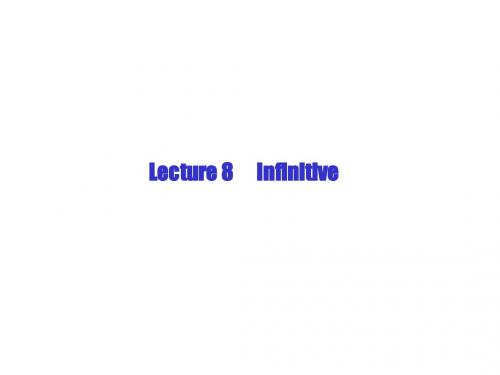
Negative infinitive:
A negative infinitive is formed by adding not or never immediately before the infinitive sign to . E.g: We decided not to buy that house. She wished never to see him again. (not/never to + the base of the verb) Ex: I promised to lend them some money. ( negative form) I promised not to lend them some money. She pretended to see me. (negative form) She pretended not to see me.
f) The bare infinitive usually appears after “ causative verb+object”. ( have, let, make, help, get, set, have, etc.) E.g.: 1.make /have/ let/help +sb +do sth. We can’t let this go on. He won’t have us criticize his work. They made me repeat the story. 2.get/set/leave + sb to do/doing sth. I can't get anyone to do the work properly. We left him to paint the gate. But when the causative verb occurs in the passive, the bare infinitive should be turned into a to-infinitive. E.g.: They made me repeat the story.
infinitive的中文翻译
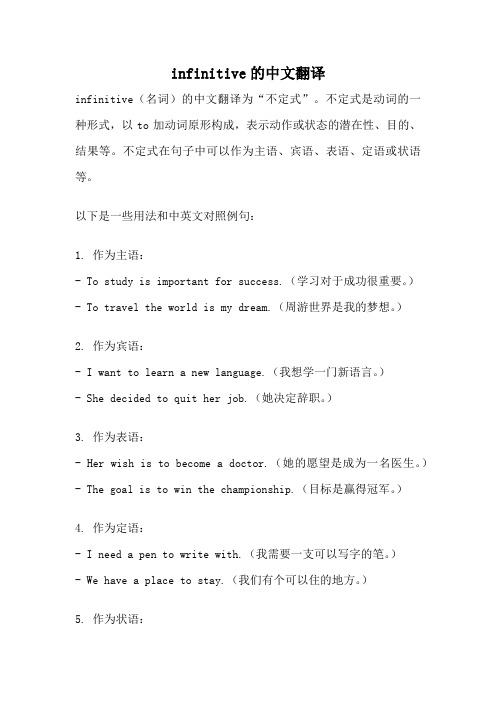
infinitive的中文翻译infinitive(名词)的中文翻译为“不定式”。
不定式是动词的一种形式,以to加动词原形构成,表示动作或状态的潜在性、目的、结果等。
不定式在句子中可以作为主语、宾语、表语、定语或状语等。
以下是一些用法和中英文对照例句:1. 作为主语:- To study is important for success.(学习对于成功很重要。
)- To travel the world is my dream.(周游世界是我的梦想。
)2. 作为宾语:- I want to learn a new language.(我想学一门新语言。
)- She decided to quit her job.(她决定辞职。
)3. 作为表语:- Her wish is to become a doctor.(她的愿望是成为一名医生。
)- The goal is to win the championship.(目标是赢得冠军。
)4. 作为定语:- I need a pen to write with.(我需要一支可以写字的笔。
)- We have a place to stay.(我们有个可以住的地方。
)5. 作为状语:- He went to the store to buy some groceries.(他去商店买些杂货。
)- We exercise daily to stay healthy.(我们每天锻炼以保持健康。
)需要注意的是,不定式也有时态和语态的变化,如过去不定式(to have done)、进行时不定式(to be doing)和完成时不定式(to have been done)等。
希望以上内容对你有所帮助!。
Infinitive
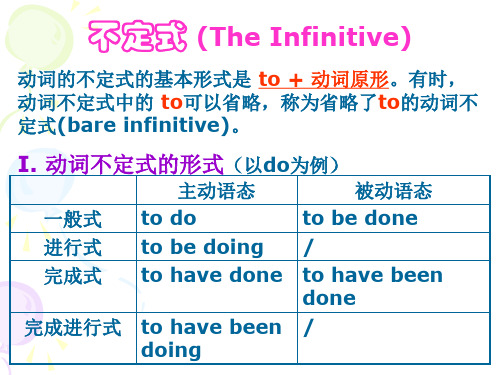
7. 作独立成分:
To be honest, to tell you the truth, to be fair (说句 公道话), to be frank(坦率地说), to make matters worse (更糟的是)
4. 作宾语补足语:
句型: 动词+宾语+ to 不定式
E.g. The doctor advised me to have a blood test.
I got them to join us in the discussion.
(expect, force, invite, persuade, want, allow ...)
动词 + 宾语 + (to be) +名词或形容词
E.g. Everyone thought Dick (to be) dead .
People believed it (to be) a true story.
(feel, consider)
5. 作定语:不定式作定语表示将来的动作或与被修饰
词是动宾关系;主谓关系;介宾关系。
不定式的进行式:
Trans: 当我进去的时候,他碰巧在打电话。 He happened to be telephoning when I went in. 当老师敲门的时候,他们假装正在睡觉。 They pretended to be sleeping when the teacher knocked at the door.
E.g. The farmer showed us how to milk.
3) it作形式宾语,动词不定式作实际宾语
不定式(Infinitive)

Him ask her for help. 练习:
一.
(1)Rather than_run risk of lost everything they accepted his term.
(2)Don Jose had grown morose and rarely left the
2
二 带to的不定式(To-infinitive与不带to的不 定式(Bare-infinitive)
• 1 在情态动词之后一般不带to
Eg:You must do as you’re told. 但边际情态动词(Mmarginal Modal Auxiliary)如: need,dare等词不同. 1)Need 作情态助动词,其后接带to不定式
第19讲 不定式(一)
不定式(Infinitive)
通常,英语动词分为:不定式,-ing分词,-ed分词。 一 不定式的结构形式 1 不定式的一般形式,进行体和完成体 a,一般式:to do
进行体式: to be doing 完成体式:to have done 完成进行体式:to have been doing b,不定式的否定形式:not/never等否定词+不定式符号 eg:We decided not to buy that house.
to的不定式。例如: John made her tell him everything.
She was made to tell him everything.
7
7,在“感觉动词+宾语”之后,在see,hear,notice,feel 等感觉动词+宾语之后用不带to不定式。例如: The two boys were sorry indeed to see him go. I watched him eat his breakfast. (1)“look at和listen to+宾语”之后也能用不带to的 不定式。 Eg: Look at that boy jump! Do you like listen to other people talk? (2)上述动词为被动语态时,不带to不定式转化为带to 不定式。 Eg: They saw him enter the building.
infinitive翻译成中文
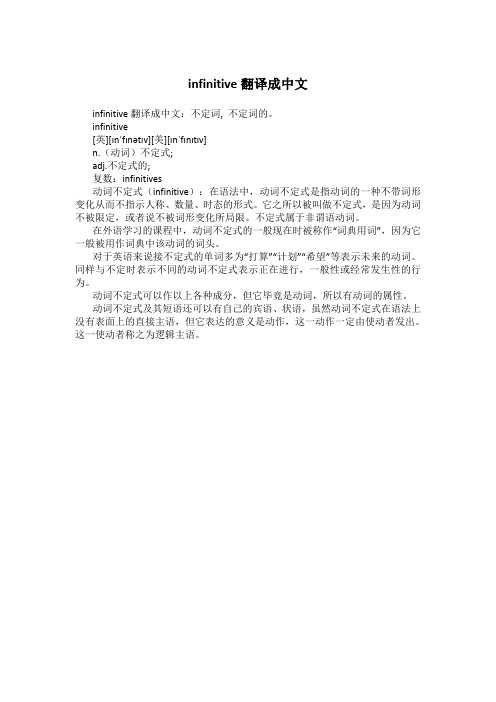
infinitive翻译成中文
infinitive翻译成中文:不定词, 不定词的。
infinitive
[英][ɪnˈfɪnətɪv][美][ɪnˈfɪnɪtɪv]
n.(动词)不定式;
adj.不定式的;
复数:infinitives
动词不定式(infinitive):在语法中,动词不定式是指动词的一种不带词形变化从而不指示人称、数量、时态的形式。
它之所以被叫做不定式,是因为动词不被限定,或者说不被词形变化所局限。
不定式属于非谓语动词。
在外语学习的课程中,动词不定式的一般现在时被称作“词典用词”,因为它一般被用作词典中该动词的词头。
对于英语来说接不定式的单词多为“打算”“计划”“希望”等表示未来的动词。
同样与不定时表示不同的动词不定式表示正在进行,一般性或经常发生性的行为。
动词不定式可以作以上各种成分,但它毕竟是动词,所以有动词的属性。
动词不定式及其短语还可以有自己的宾语、状语,虽然动词不定式在语法上没有表面上的直接主语,但它表达的意义是动作,这一动作一定由使动者发出。
这一使动者称之为逻辑主语。
INFINITIVE_AND_GERUND

GERUND AS VERB
1. With object On leaving school, he went into business. 2. With complement We soon began feeling tired. 3. With adverbs Rising early is good for your health. 4. Passive and perfect tense I am glad of having met you. I don’t like being asked to make a speech.
GERUND AS NOUN
動名詞是具「動詞的外表」與「名詞的內 涵 」的詞類,也就是動詞名詞化。
动名词作主语表示抽象的一般行为. 不定式作主语表示具体动作; Smoking is prohibited here. It is stupid of you to write down what the teacher says.
GERUND AS VERB
The subject of gerund 1) general reference (we, they, etc.) It is foolish behaving like that. Walking is good for the health. 2) the same as the subject in the sentence He succeeded in solving the problem. What if the subject is different from either general reference or the sentence subject?
infinitive的中文翻译

infinitive的中文翻译infinitive的中文翻译是"不定式"。
在英语中,不定式是动词的一种形式,通常以"to"开头(例如:to go、to eat)。
不定式可以用作名词、形容词或副词,并且可以有自己的主语或宾语。
下面是一些例句来说明不定式的用法和中英文对照:1. 作为名词:- To learn is important for personal growth.(学习对于个人成长很重要。
)- I have a lot of things to do today.(我今天有很多事情要做。
)2. 作为形容词:- I need a place to live.(我需要一个住的地方。
)- He is a difficult person to deal with.(他是一个难以相处的人。
)3. 作为副词:- She runs to stay fit.(她跑步保持身材。
)- He spoke softly to avoid waking the baby.(他小声说话以免吵醒婴儿。
)4. 不定式的时态与语态:- He wants to go to the movies tonight.(他想今晚去看电影。
) - She hopes to be invited to the party.(她希望被邀请参加派对。
)5. 动词后的不定式短语:- I decided to quit my job and start a new career.(我决定辞职并开始新的职业。
)- She promised to help me with my homework.(她答应帮我做作业。
)6. 动词后的不定式短语作为目的状语:- I bought some groceries to cook dinner.(我买了一些杂货来做晚饭。
)- He went to the store to buy a new phone.(他去商店买新手机。
infinitive动词不定式解析

作使役动词的补语 I am sorry for having you waiting so long. I will have Bob take your suitcase,sir.
什么情况下用不带to的不定式做宾补
一感觉二听三让四看: 一个表示感觉的词—feel; 两个表示听—hear,listen to; 三个表示让—let, make, have; 四个表示看—see,look at,watch,notice
囧
不定式短语作定语和被修饰词之间表示以下关系: (1)表示将来的动作(例①).
(2)与被修饰词之间有动宾关系 ,如是不及物动词,则需加 介词(例④). (3)与被修饰词之间有动宾关系 ,同时与句中其它词之间 又有逻辑上的主谓关系时,尽管有被动含义,却仍 用主 动语态 ( 例③ ); 如只有动宾关系 , 而无逻辑上的主谓关 系,则需用被动语态(例②).
1.不定式作宾语 ①以下动词后 , 只能跟不定式作宾语 . 如 :agree,ask, aim,arrange,choose,decide,demand,expect,fail,help, hope,long,manage,offer,plan,prepare,pretend,promi -se, refuse, wish等
He feels it his duty to help the poor.
③介词but, except, besides +to do(do) 在这种句型中,如介词前有动词do,后面应接不 带to的不定式;如无do,则接to不定式,即带do不 带to, 带to不带do. 如: The enemy soldiers had no choice but to give in. On Sunday afternoon I had nothing to do but watch TV.
不定式
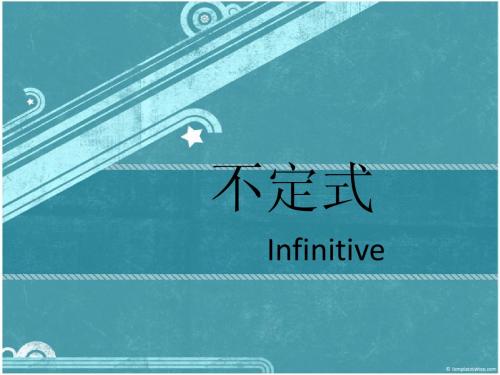
二、不带to 的不定式(The bare infinitive)
• 1.情态助动词之后用不带to 的不定式 • 不带to的不定式的主要用法是放在情态助动 词will,shall,would,should,can,could, may, might,must之后,所有的情态助动 词(除ought外)后必须跟不带to的不定式。 例如:
• (4)主语是带有动词do的主语从句时: • What I want to do is take a holiday now. • What they are seeking to do is discover the form of the book from its content.
• (5)主语是以动词say作谓语的定语从句所修 饰的all时: • All they said is hurry up please. •
• 二)动词+宾语+不定式
• 有些动词必须先带宾语,然后再带不 定式,最常用的这类词包括: accustom, admit, aid, advise, allow, appoint, ascertain, ask, assist, authorize, bear, beckon, beg, believe, bring, bribe, call, cause, caution, challenge, charge, coax, coerce, command, compel, condemn, consider, convince, dare, decide, defy, demand, designate, desire,
• 6.当不定式结构由and, or, except, but, than连 接时,第二个不定式通常不带to。例如: • I want to lie down and go to sleep. • Do you want to have lunch now or wait till later? • We had nothing to do except watch the TV. • I'll do anything but work as a driver.
不定式

当三个或三个以上带to不定式构成排比结构(Parallel Construction) 时,所有不定式符号均需保留。
3、不定式符号to与介词to的辨别问题
a)动词+介词to 这类搭配常见的有add to,agree to,adhere to(坚持),admit to, allude to(暗示),amount to(等于),attend to,attest to,bow to(顺从),cling to,come to,correspond to(等于),confess to, consent to,contribute to,object to,get to,pertain to(属于), react to,resort to,revert to,refer to,relate to,submit to, succeed to,stick to,swear to(强调地说),take to,trust to, witness to,yield to等。例如: Keeping what belongs to another amounts to stealing. He swore to having paid for the goods.
但是,当某些动词如agree,swear,come,get接不定式则含义不同。
详见语法书P226
b)动词+名词/代词+介词to 这类搭配常见的有ascribe…to(归因于),apply…to,attribute…to (归因于),abbreviate…to(缩写为),accustom…to,confine…to, commit…to(使负有责任),devote…to,dedicate…to,owe…to(归 功于),prefer…to,reconcile…to(安于),reduce…to,resign…to(听 任)等。例如: He applied himself to learning English. The doctor devoted himself to finding a cure. c)动词+-ed分词+介词to 这类搭配常见的有be accustomed to,be abbreviated to(缩写为),be reduced to,be resigned to(听任),be devoted to,be given to,be used to 等。例如:
8-Infinitive不定式结构

Note: help to do and help do are both acceptable.
A test item in TEM 4
"It seems that she was there at the conference." The sentence means that ____. A. she seems to be there at the conference. B. she seemed to be there at the conference. C. she seems to have been there at the conference. D. she seemed to being there at the conference. (2009)
Infinitive ―to‖ or preposition ―to‖?
Distinguish infinitive ―to‖ & preposition ―to‖ —— If ―to‖ can be followed by a noun or noun equivalent, it proves to be a preposition. Otherwise, it is an infinitive sign. The following are some examples of the collocations in which the item ―to‖ is preposition, not an infinitive sign. A) verb + preposition ―to‖, e.g. confess to attest to contribute to refer to agree to bow to object to submit to stick to adhere to pertain to take to yield to attend to resort to come to relate to amount to react to consent to … When it comes to belling the cat, the mice have nothing to say. He will not submit to being separated from her. Keeping what belongs to others amounts to stealing.
Infinitive 不定式

2. 作结果状语
e.g. He lifted a rock only to drop it on his own feet. She lived to be 100.
*** too (adj. / adv.) to do adj. / adv. enough to do sth. / for sth. enough n. to do sht. / for sth.
C. 形容词特征
1. 做后置定语
(名词)only, first 或last 修饰或是the first / the last时 e.g. The first thing (for me) to do is … He is the last one (for me) to turn to. (=It is impossible for me to ask him for help.)
D. 副词特征
1.做目的状语= in order to do (常用于句 首)/ so as to do(一般不放在句首 )
e.g. He decided to work hard in order (so as) to catch up with others. We must learn from other countries to achieve this aim.
Hale Waihona Puke I. Usage of infinitives
A. 动词特征:可以带自己的逻辑主语,宾语 或状语
e.g. My job is to teach students here every day. It’s easy for me to make a model plane.
Infinitive

★If the base of the infinitive is the verb be or have, it should be retained, even though its complementation is omitted. e.g. Aren't you the manager? No, I don't want to be.
1 Forms of the infinitive
2 Notes on the use of the infinitive sign 3 Combinations of infinitives with adj. / n. / v.
1 Forms of the infinitive 2 types of infinitive: to-infinitive & bare infinitive.
But when taking other positions , the following infinitive may be with or without to. e.g. He decided to go fishing rather than (to) stay in the dormitory. The manager believes it is important to invest in new machinery rather than (to) increase wages.
2) Ellipsis of the infinitive sign a) When two to-infinitives are coordinated by and / or, the second to is usually omitted. e.g. I intend to call on him and discuss this question again. b) When there is a contrastive meaning, the second to must be retained. e.g. To be or not to be, that is the question. c) The infinitive sign cannot be omitted if there is no coordinator between the coordinate infinitives. e.g. Please go to the seaside to swim, to get suntanned. d) Nor can any infinitive sign be omitted if a sequence of infinitives occur in a parallel construction. e.g. The student must learn to read extensively, to analyze what he reads and to summarize the main points presented.
Infinitive

Definition
• 动词根据是否受到限制,分为限定动词和非限定 动词。
• 限定动词受人称(person)、数目(number)和时态 (tense )的限制。此外,还有语态(voice)和情态 (mood)等。通常作句子的谓语。 例如: ① Good leaders serve the people whole-heartedly. ② Jason is giving a public lecture. ③ Who did it? ④ I would appreciate it if you could do me a favor.
• 现代英语倾向于采用先行词it,将不定式结构 后置。 e.g.: It is quite dangerous to lean out of the window. It is my pleasure to meet you. It is very important to develop education.
b) 表示结果 不定式结构表示结果常用于下列搭配: so as… to, such…as to…, enough to…, too… to…等。 e.g.: He is so careless as to get everything confused. He is such a fool as to think that he will win everyone. 男孩很高够得上天花板了。 The boy is tall enough to reach the ceiling. 她的视力太差,无法阅读这么小的字母。 Her eyesight is too poor to read such small letters.
Infinitive
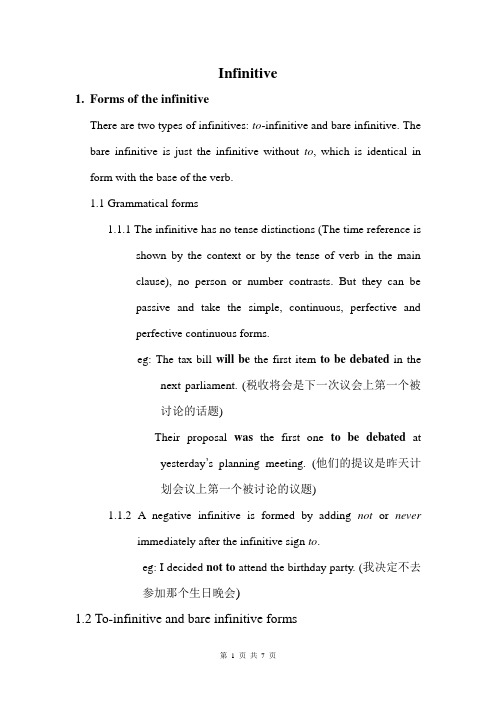
Infinitive1.Forms of the infinitiveThere are two types of infinitives: to-infinitive and bare infinitive. The bare infinitive is just the infinitive without to, which is identical in form with the base of the verb.1.1 Grammatical forms1.1.1 The infinitive has no tense distinctions (The time reference isshown by the context or by the tense of verb in the mainclause), no person or number contrasts. But they can bepassive and take the simple, continuous, perfective andperfective continuous forms.eg: The tax bill will be the first item to be debated in the next parliament. (税收将会是下一次议会上第一个被讨论的话题)Their proposal was the first one to be debated atyesterday’s planning meeting. (他们的提议是昨天计划会议上第一个被讨论的议题)1.1.2 A negative infinitive is formed by adding not or neverimmediately after the infinitive sign to.eg: I decided not to attend the birthday party. (我决定不去参加那个生日晚会)1.2 To-infinitive and bare infinitive forms1.2.1 To-infinitive forms1.2.2Bare infinitive formsa) When several infinitives have the same faction, to can beonly used before the first infinitive to avoid repeating.eg: It is just impossible to see that and not feel angry. (看见它不感到生气是不可能的)But when two infinitives express contrast meaning, or justto emphasize, we cannot omit to.eg: To die or not to die—that is the question. (是生还是死,这就是问题所在)b) The questions begin with whyeg: Why leave the window open? (为什么把窗户打开?)c) After these phrases had better, had best, would rather…than,rather than, would sooner (…than ) , cannot (help) but, donothing but, might (just) as well, do nothing besides | than |except | save, etc, we often omit to.eg: She can’t do anything but ask silly questions.(她一个劲地问一些傻问题)But if there are not object verbs do or help before but orexcept, to is cannot be omitted.d) After these verbs hear, listen to, feel, look at, watch, notice,observe, perceive, let, make, bid, have, note, leave, let, etc, tocan be omitted when infinitive works as object complements.eg: I didn’t notice her go out.(我没注意到她出去了)e) We can omit to after go, come, and run with another new verbwhen it is used in a sentence to express order, suggestion, orrequirement.eg: I’ll go see my sister.(我将去看我的妹妹)f) When rather than or sooner than used in front of a sentence,we can omit to.eg: Rather than travel by air, he preferred a train on histour.(比起坐飞机,在旅行时他宁愿做火车)g) In the phrases such as make believe, let go, hear tell, go hang,etc, we can omit to.eg: He made believe he was innocent.(他假装他是清白的) 2. Element of infinitive in a sentence2.1 subjecteg: To love and to be loved is the greatest happiness on earth. (爱与被爱是人间最大的快乐)Sentences with an infinitive phrase as their subject can sound moreformal.eg: It is necessary for me to get up at 6:00.(我必须在六点起床) 2.2 predicativeeg: The greatest happiness is to work for the happiness of all. (最大的快乐就是为大家的快乐而工作)2.3 objecteg: He offered to go with us. (他提出要和我们一起走)Sentences with an infinitive phrase as their object can sound more formal.eg: I think it better not to go. (我认为最好不去)2.4 complement2.4.1 subject complementeg: My purpose is to help him.(我的目的是帮助他)2.4.2 object complementeg: I want my son to became a lawyer.(我想让我的儿子成为一名律师)2.5 attributeeg: He usually has a lot of meetings to attend in the evening.(他通常晚上有很多会议要参加)2.6 adverbial2.6.1 the infinitive of purpose adverbialeg: Dave took a year out to see the world and broaden hisexperience.(Dave花了一年的时间去周游世界,并开阔自己的眼界)2.6.2 the infinitive of result adverbialeg: Eliza rejoined her friends, only to discover that Mr. Darcy hadleft.(Eliza重新加入了她的朋友,意外发现Darcy先生已经离开了)2.6.3 the infinitive of reason adverbialeg: He was glad to learn the news.(他很高兴去听到这条新闻)2.6.4 the infinitive of condition adverbialeg: One will get into trouble to attempt.(一个人去尝试的话会陷入麻烦)2.6.5 the infinitive of manner adverbialeg: I think the way to express my opinion is saying it directly.(我认为表达我的观点的方式就是直接把它说出来)2.6.6 We sometimes use infinitive to add a comment to something.eg: I am not very keen on it, to tell you the truth.(实话实说,我并不是对它很感兴趣)3. Collaboration3.1 After some object verbs, these verbs often express requirements,requests, choices, decides, plans, agreements…afford, agree, aim, appear, arrange, attempt, bother, believe, care,choose, claim, come, consent, dare, decide, demand, desire, determine, decline, expect, elect, endeavor, fall, hesitate, offer, happen, help, hope, intend, seek, learn, long, mean, manage, neglect, tend, pledge, prepare, pretend, promise, wish, refuse, seem, resolve, swear, tend, undertake, volunteer, wait,……3.2 As complex objects after some verbsadvise, allow, ask, beg, bribe, cause, challenge, command, compel, convince, direct, enable, encourage, expect, forbid, force, induce, instruct, oblige, order, permit, persuade, remind, request, require, teach, tell, train, urge, want, warn, ……3.3 After ‘verb + prep ’ ,we can use infinitive.appeal to, call on, care for, count on, depend on, long for, plead with, prevail on, rely on, shout to, wait for, ……3.4 After adjectives and nounsAdj: able, afraid, anxious, ashamed, bound, careful, certain, crazy, due, eager, fit, happy, impossible, likely, lucky, pleased, right, shocked, sure, surprised, thrilled, welcome, wrong, ……Noun: attempt, bid, decision, desire, incentive, need, nuisance, opportunity, place, reason, time, wish, ……We can use a noun + to + infinitive after there is or are and have (got) to express an obligation.eg: Don’t disturb me, I’ve got a report to write this evening.(不要打扰我,我今晚必须要写报告)4. Some problems about infinitive form4.1 the omit of infinitiveeg: Would you like to come with us? ---Y es, I’d love to.4.2 spilt infinitive—add an adverb between to and verbeg: He likes to half close his eyes.4.3 coordinate infinitiveeg: We ought to read more and have more practice.。
3、英语语法学习笔记-非谓语动词

非谓语动词谓语动词的另一个称谓叫限定性动词(finite verbs),与之相对的非限定性动词(non-finite verbs)不受到主语、人称限制、限定的动词,此类动词失去表达时间和人称的能力。
这样的动词就是非谓语动词。
谓语动词是句子的核心,非谓语动词职能出现在非核心的内容中。
1、动词不定式(infinitive)不定式是指不受人称、时间的限制,通常为to+动词原形。
如:To be or not to be,that is the question.此类句子被称为完全不定式(full infinitive )但是有时to也会被省略,如:You helped me (to) cook the carrot.此类句子被称为裸不定式(bare infinitive)谓语动词只能作为核心成分,非谓语动词可以做其他成分。
(1)动词不定式做主语To eat a carrot every day is good for the rabbit.划线部分即为句子的主语,如果用it作为形式主语来代替主语,而将主语“To eat a carrot every day”放在谓语动词之后,It is good for the rabbit to eat a carrot everyday.(it is + adj+for sb+to do sth.)这句话也是带形式主语。
(2)动词不定式做宾语The rabbit likes to eat carrots.注意有的动词后面不能接作为宾语的动词不定式。
I consider(复杂及物动词)the rabbit smart.用it作为形式宾语,I consider it important to eat a carrot everyday.(3)动词不定式作为宾语补足语The rabbit expected the wolf to eat a carrot.see、find、watch、have、make、left这类使役动词用不定式作宾语时,必须省略to,如:Carrots make the rabbit feel happy.其他谓语动词接不定式作为宾语补足语时,是否省略to都是正确的表达。
infinitives 用法

infinitives 用法Infinitive phrases are versatile and powerful tools in the English language. They are formed by using the base form of a verb, usually preceded by the word "to." Infinitives can be used in a variety of ways to add extra information or clarify the purpose or intention of an action. In this article, we will explore the different ways infinitives are used and provide detailed explanations and examples for each.1. Infinitives as noun phrases:Infinitives can act as noun phrases in a sentence. They can serve as subjects, direct objects, objects of prepositions, or complements. Let's look at some examples of each:- Subject: To travel is my biggest dream. (Here, "to travel" acts as the subject of the sentence.)- Direct Object: I want to eat pizza. (In this sentence, "to eat pizza" acts as the object of the verb "want.")- Object of Preposition: She went to the store to buy groceries. ("To buy groceries" acts as the object of the preposition "to.")- Complement: Her goal is to become a doctor. ("To become adoctor" acts as the complement of the verb "is.")2. Infinitives as adverbs:Infinitives can also function as adverbs in a sentence. They provide additional information about the action or verb in the sentence. Infinitives used as adverbs can express purpose, result, cause, or time. Let's explore some examples:- Purpose: I went to the gym to exercise. ("To exercise" explains the purpose of going to the gym.)- Result: She studied hard to pass the exam. ("To pass the exam" explains the result or consequence of studying hard.)- Cause: He skipped breakfast to catch the bus. ("To catch the bus" explains the cause of skipping breakfast.)- Time: We woke up early to watch the sunrise. ("To watch the sunrise" indicates the time at which we woke up early.)3. Infinitives as adjectives:Infinitives can also act as adjectives, providing information about nouns. They usually come after the noun they modify. Let's seesome examples of infinitives used as adjectives:- She bought a dress to wear to the party. ("To wear to the party" describes the dress.)- He is looking for a car to drive on weekends. ("To drive on weekends" describes the car.)- They hired a teacher to help with their studies. ("To help with their studies" describes the teacher.)4. Infinitives in imperative sentences:Infinitives are often used in imperative sentences to give commands, instructions, or advice. In these cases, the word "to" is often omitted. Let's look at some examples:- Eat your vegetables! (Here, "eat" is the infinitive used as a command.)- Study hard to succeed. ("Study hard" is the imperative sentence with an infinitive as advice.)- Take a deep breath to relax. ("Take a deep breath" is the instruction with an infinitive.)In conclusion, infinitives have a wide range of uses in the English language. They can act as noun phrases, adverbs, adjectives, or be used in imperative sentences. Understanding how to use infinitives effectively can greatly enhance one's ability to express thoughts, intentions, and actions in a variety of contexts. So, practice using infinitives in your writing and speech to improve your overall English language skills.。
infinitive不定式
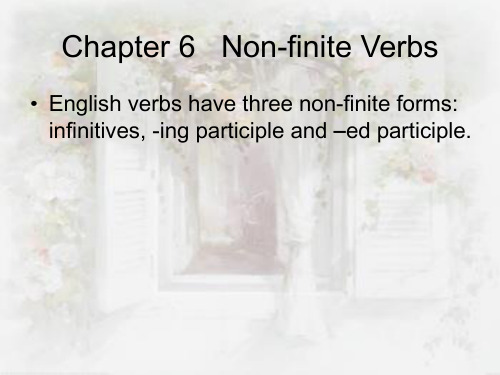
It’s + adj. +infinitive
1. 很难说哪个更好。It is hard to say which (one) is better. 2. 这样做是不明智的。It is unwise to do like this. 3. 要说服她是不容易的。It is not easy to persuade her. 4. 这些文章有必要都看吗?Do these articles all need to be read? 5. 有可能筹到这笔资金吗?Is it possible to raise the fund/money? 6. 一天完成这项工作是不可能的。It is impossible to finish the work in one day.
• 1、他将教我们怎么玩这个游戏。He will teach us how to play the game. • 2、她想不出该说什么。She can᾿t think out what to say. • 3、我将教你怎样游泳。I will teach you how to swim. • 4、我们不能决定下一步干什么。We can᾿t decide what to do next. • 5、我们要学会怎样和他们打交道。we should learn how to get along with them. • 6、我忘了这话英语该怎么说。I forget how to say thie in English. • 7、他是啼笑皆非。He doesn᾿t know whether to
Chapter 6 Non-finite Verbs
• English verbs have three non-finite forms: infinitives, -ing participle and –ed participle.
